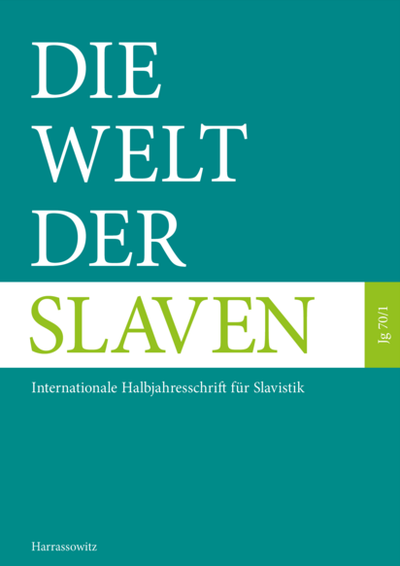„Nicht nur mit dem Gedanken, sondern mit dem ganzen Wesen“
Lev Tolstoj über das Wissen, das tote Papier und die lebendige Tat
DOI:
https://doi.org/10.13173/WS.70.1.062Schlagwörter:
Lev Tolstoj, Boris Čičerin, Wilhelm H. Riehl, state school, Volkskunde, knowledge formationAbstract
“Not only with the thought but with the whole being”: Lev Tolstoj on knowledge, dead paper and living action
The article discusses Lev Tolstoj’s involvement in the controversy between the Russian Westerners (Sergej Solovʹev, Boris Čičerin) and the Slavophiles (Konstantin Aksakov, Aleksej Xomjakov, Jurij Samarin) about the nature and character of historical knowledge. This controversy about “true” historical knowledge forms the ideological background for Tolstoj’s reflections on the problem of knowledge. This polemic revolves around the Russian reception of Wilhelm Heinrich Riehl, whose works and idea of “living science” also find great support with Tolstoj. In his correspondence with Boris Čičerin and later in literary texts (especially in the novel Anna Karenina), Tolstoj develops a peculiar theory of intuitive knowledge that places “living” experience and action above “dead paper”, i.e. above academic knowledge.
Literaturhinweise
Aksakov, Konstantin S. 1857. Zamečanija na statʹju g. Solovʹeva „Šlecer i antiistoričeskoe napravlenie“. Russkaja beseda 7(3). 104–141.
Bezobrazov, Vladimir. 1857a. Fiziologija obščestva. Russkij vestnik 6. 281–316.
Bezobrazov, Vladimir. 1857b. Materialy dlja fiziologii obščestva: W. H. Riehl, Die Naturgeschichte des Volkes als Grundlage einer deutschen Social-Politik. Russkij vestnik 9–10. 657–720.
Bezobrazov, Vladimir. 1858. Materialy dlja nauki ob obščestve v Germanii: Čerty iz narodnoj žizni v Germanii. Naturgeschichte des Volkes von Riehl: Land und Leute. Russkij vestnik 3–4. 218–271.
Bogdanov, Konstantin. 2018. Lev Tolstoj, Lui Paster i bešenye sobaki: Očerk christianskoj antrozoologii. Novoe literaturnoe obozrenie (NLO) 5 (153). 31–68.
Čičerin, Boris N. 1858. Opyty po istorii russkogo prava. Moskva.
Čičerin, Boris N. 1929 [1973]. Vospominanija Borisa Nikolaeviča Čičerina: Zapisi prošlogo. Moskva.
Dmitriev, Alexandr. 2011. „Russkaja beseda“ v Germanii: Istorija slavjanofilʹskoj antologii „Russkie fragmenty…“ izdannoj v Germanii Fr. f. Bodenštedtom. In „Russkaja beseda“: Istorija slavjanofilʹskogo žurnala: Issledovanija, materialy, postatejnaja rospisʹ, 278–300. Sankt-Peterburg.
Ėjchenbaum, Boris M. 2009. Raboty o Lʹve Tolstom. Sankt-Peterburg.
Kolstø, Pål. 2005. Power as burden: The Slavophile concept of the state and Lev Tolstoy. Russian Review 64(4). 559–574. DOI: 10.1111/j.1467-9434.2005.00374.x.
Lövenich, Friedhelm. 1992. Verstaatlichte Sittlichkeit: Die konservative Konstruktion der Lebenswelt in Wilhelm Heinrich Riehl „Naturgeschichte des Volkes“. Opladen.
Mollenhauer, Daniel. 2002. „Den Volksgeist beschwören“: Wilhelm Heinrich Riehls „Wissenschaft vom Volke“ und die Konstruktion eines deutschen „Nationalcharakters“. In Einfalt, Michael & Jurt, Joseph & Mollenhauer, Daniel (Hg.), Konstrukte nationaler Identität: Deutschland, Frankreich und Großbritannien (19. und 20. Jh.), 155–169. Würzburg.
Riehl, Wilhelm H. 1861a. Die Bürgerliche Gesellschaft. Stuttgart.
Riehl, Wilhelm H. 1861b. Land und Leute. Stuttgart, Tübingen.
Riehl, Wilhelm H. 1899. Geschichten und Novellen: Gesamtausgabe. Bd. 1. Stuttgart.
Samarin, Jurij F. 1857. Zamečanija na statʹju g. Solovʹeva „Šlecer i antiistoričeskoe napravlenie“ („Avtor statʹi o Šlecere vozveščaet publike ob otkrytoj im antiistoričeskoj škole…“). Russkaja beseda 7(3). 90–103.
Solovʹev, Sergej M. 1858. Pervoe istoričeskoe pisʹmo. Russkij vestnik 14(1). 5–28.
Soloʹvev, Sergej M. 1895. Istorija Rossii s drevnejšich vremen. Bd. 1. S.-Peterburg.
Thiergen, Peter. 1979. Wilhelm Heinrich Riehl in Russland (1856–1886); Studien zur russischen Publizistik und Geistesgeschichte der zweiten Hälfte des 19. Jahrhunderts. Gießen.
Tolstoi, Lew. 2022. Anna Karenina: Roman in acht Teilen. (Übers. Rosmarie Titze.) München.
Tolstoj, Lev Nikolaevič. 1928. Pisʹma Tolstogo i k Tolstomu. Moskva, Leningrad.
Tolstoj, Lev. 1934. Polnoe sobranije sočinenij v 90 tomach. Bd. 18. Moskva.
Tolstoj, Lev. 1936. Polnoe sobranije sočinenij v 90 tomach. Bd. 8. Moskva.
Tolstoj, Lev. 1952. Polnoe sobranije sočinenij v 90 tomach. Bd. 48. Moskva.
Turgenev, Ivan. 1987. Polnoe sobranie sočinenij i pisem v 30 tomach. Bd. 15 (Pisʹma, Bd. 3). 2. Aufl. Moskva.
Vinitsky, Ilya. 2015. Tolstoy’s lessons: Pedagogy as salvation. In Allen, Elizabeth Cheresh (ed.), Before they were titans: Essays on the early works of Dostoevsky and Tolstoy, 299–316. Boston.
von Altenbockum, Jasper. 1994. Wilhelm Heinrich Riehl 1823–1897: Sozialwissenschaft zwischen Kulturgeschichte und Ethnographie. Köln, Weimar, Wien.
Walicki, Andrzej. 1975. The Slavophile controversy: History of a conservative utopia in nineteenth-century Russian thought. Oxford.
Walicki, Andrzej. 1979. A history of Russian thought: From the Enlightenment to Marxism. Stanford.
Wutsdorff, Irina. 2009. Erzählen wider das Erzählen: Tolstojs Darstellung von Levins Sinnsuche in Anna Karenina. Zeitschrift für slavische Philologie 11. 94–127.

